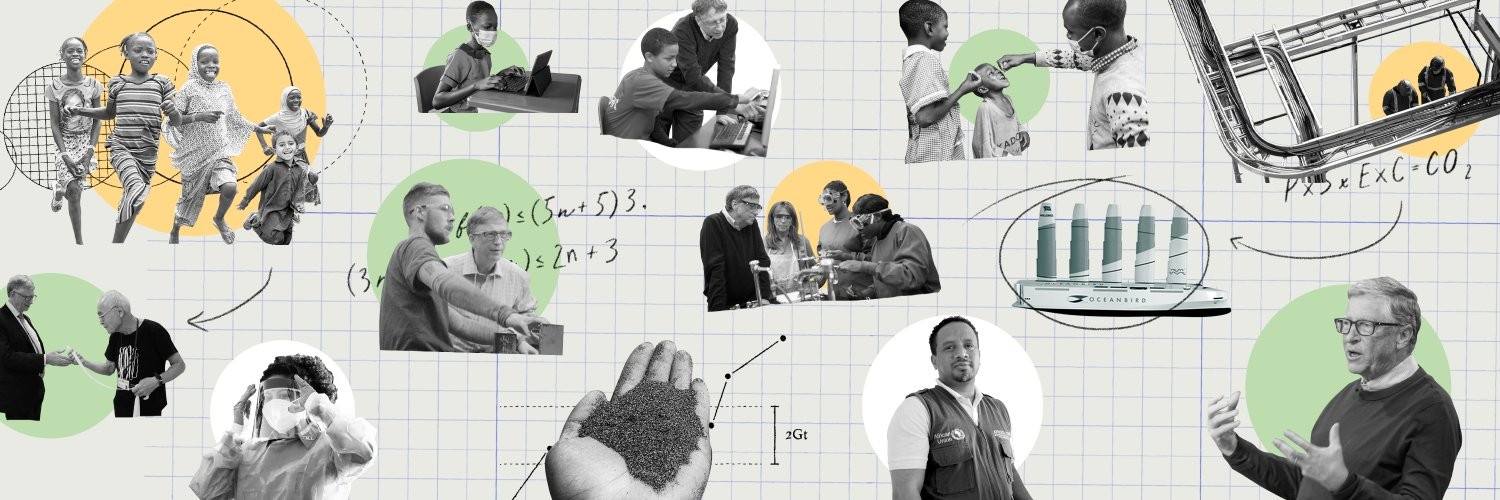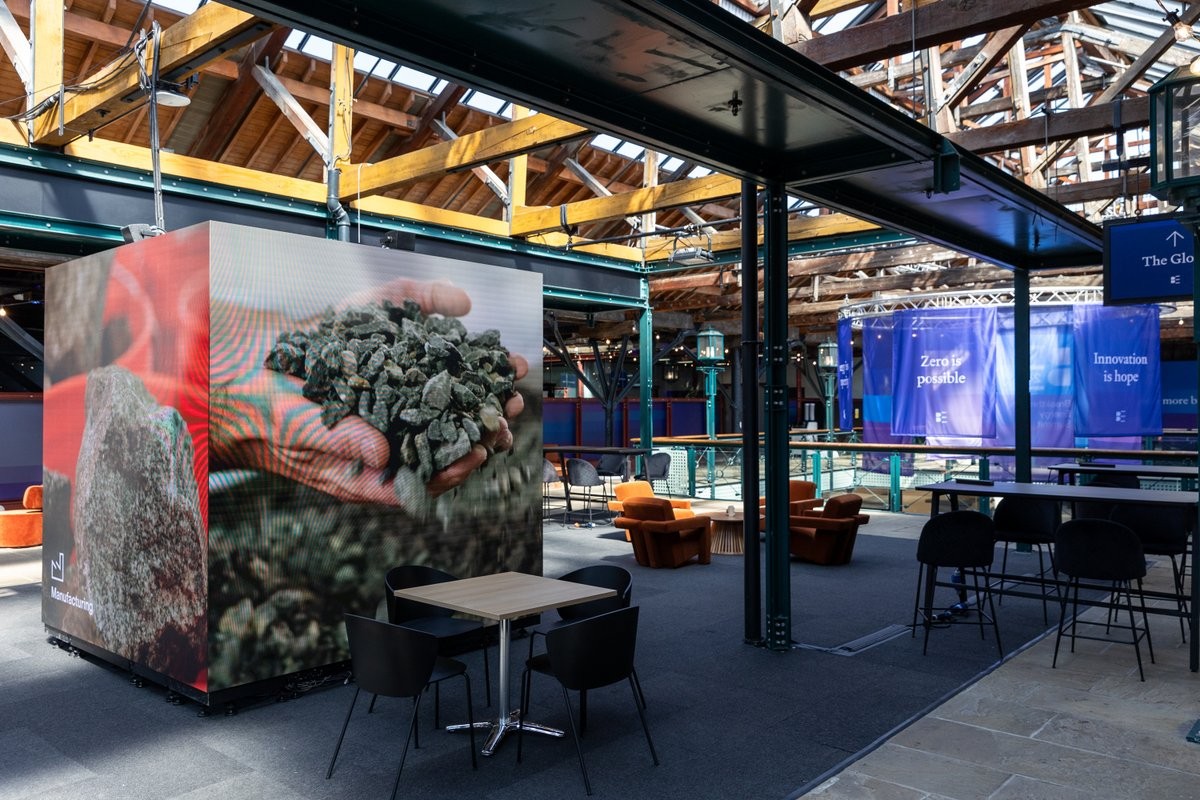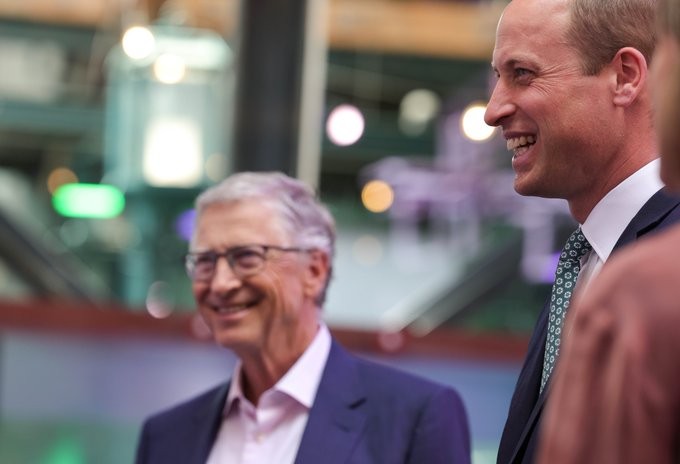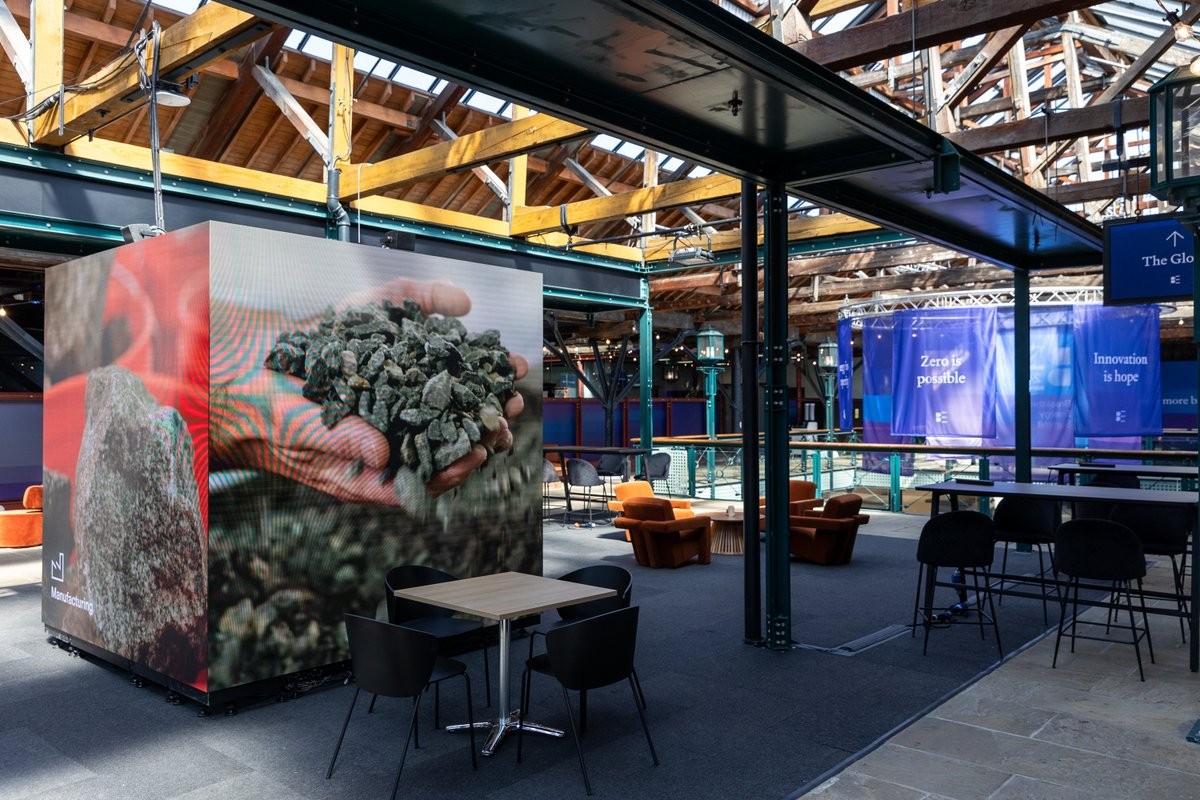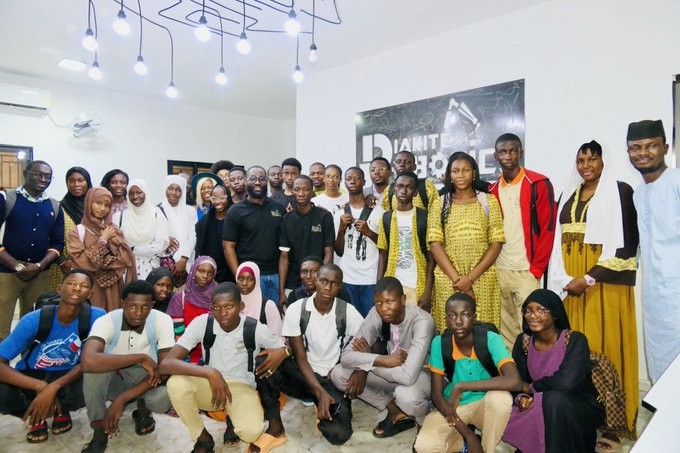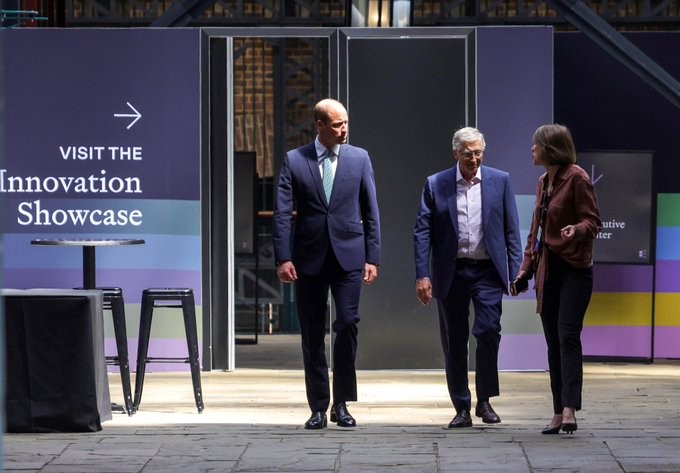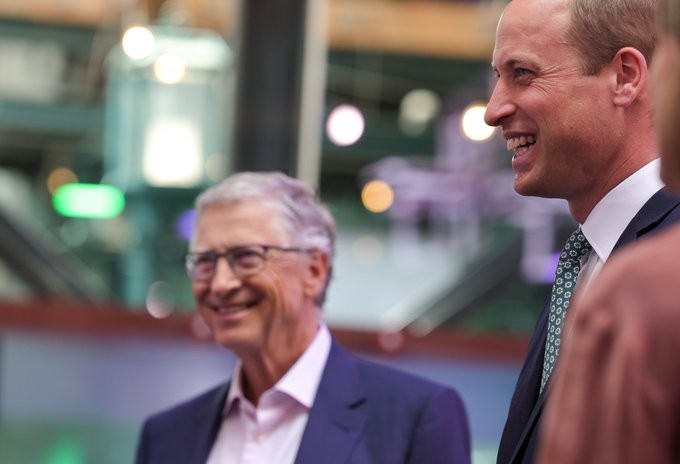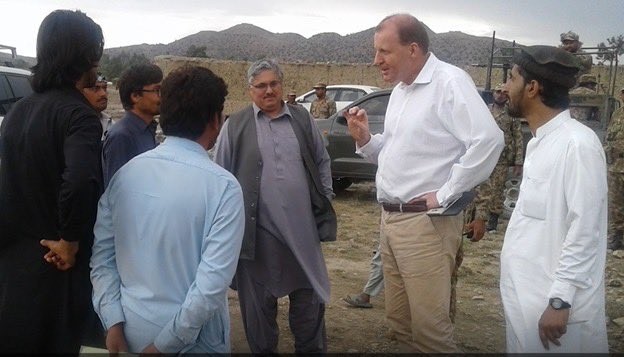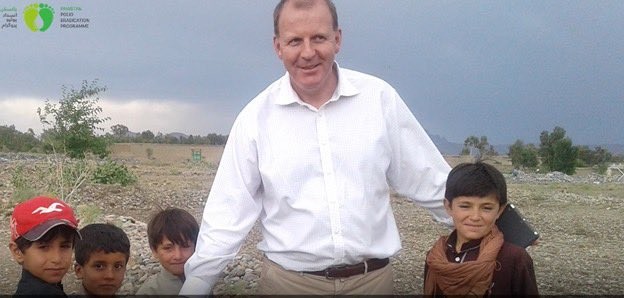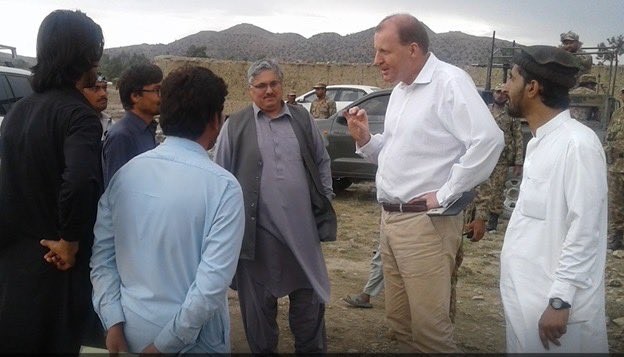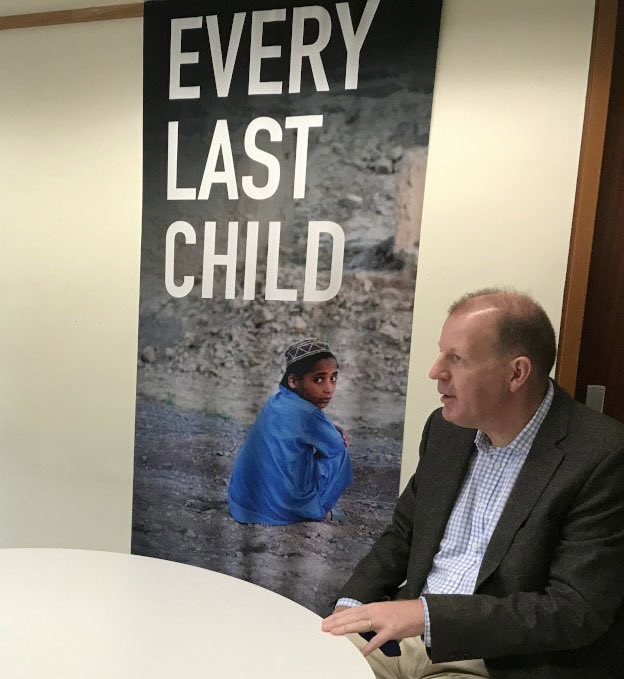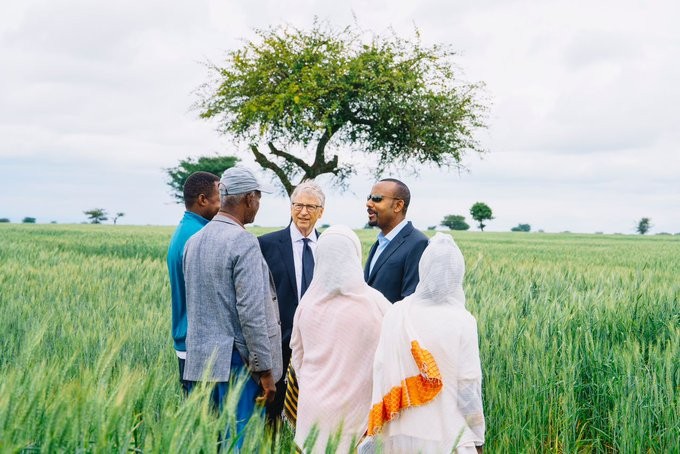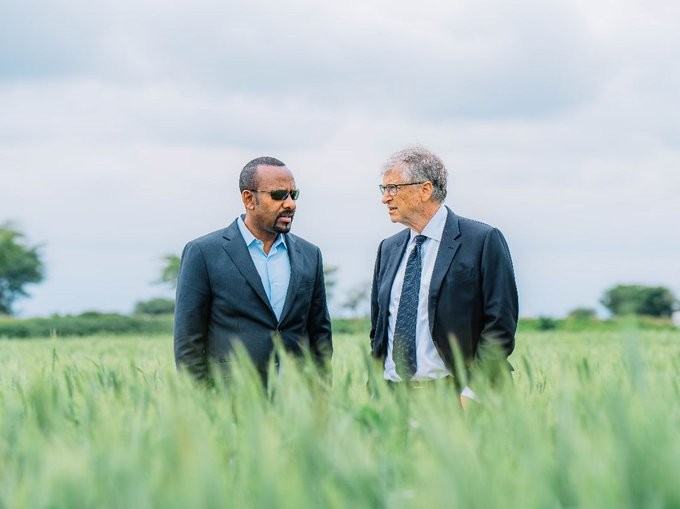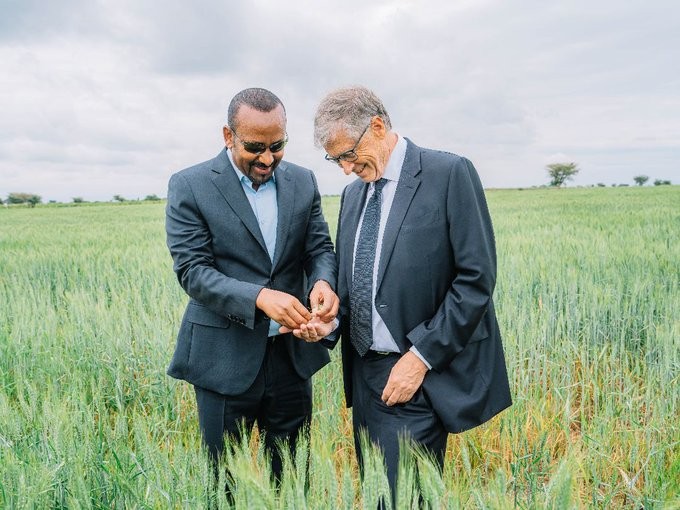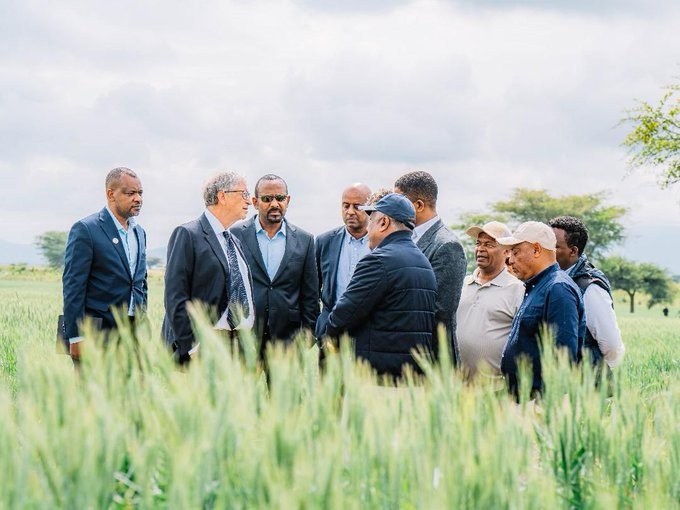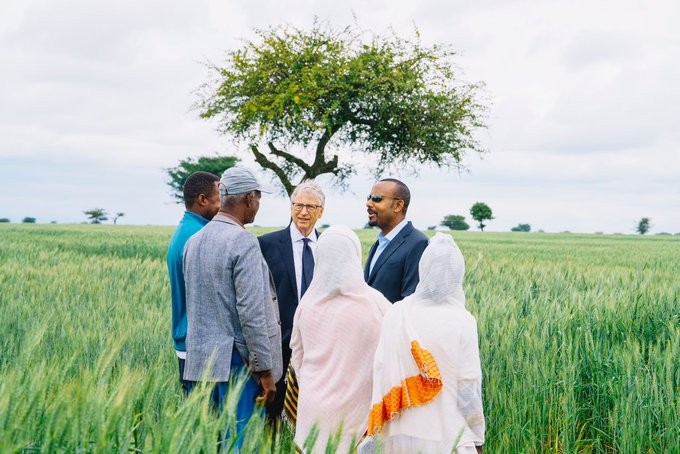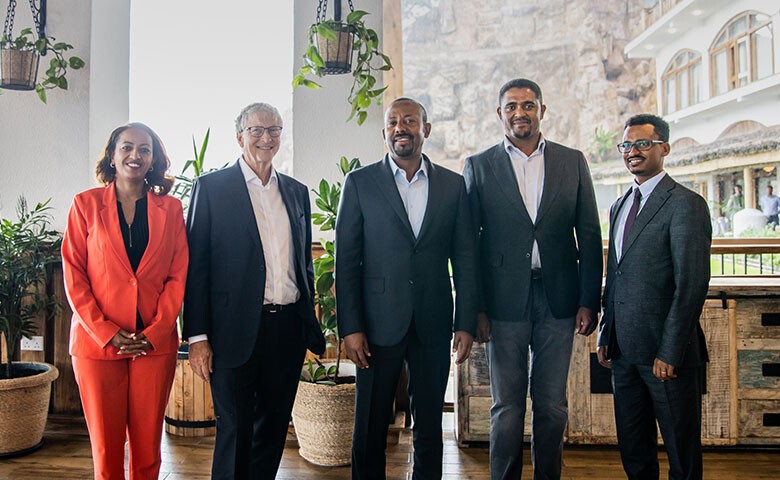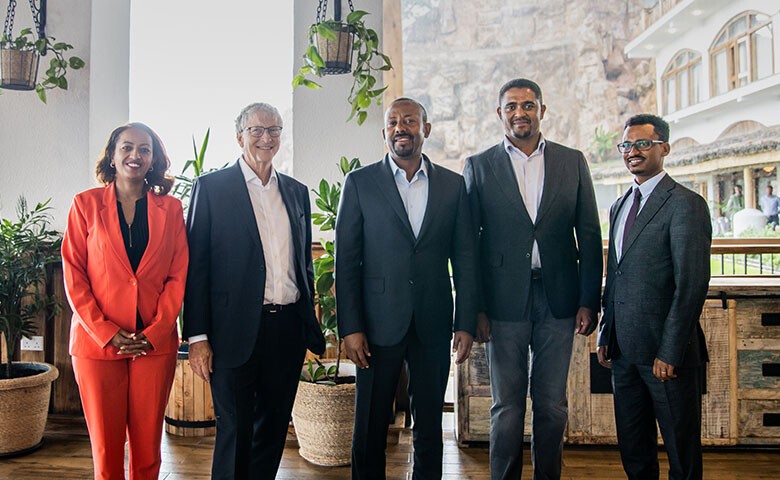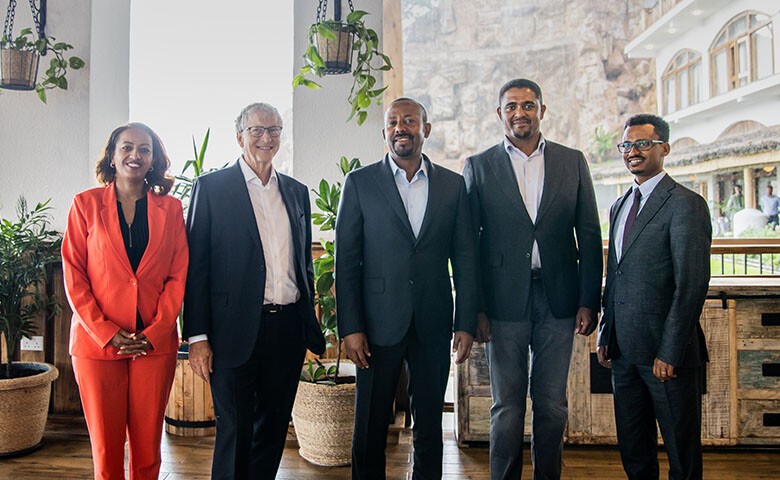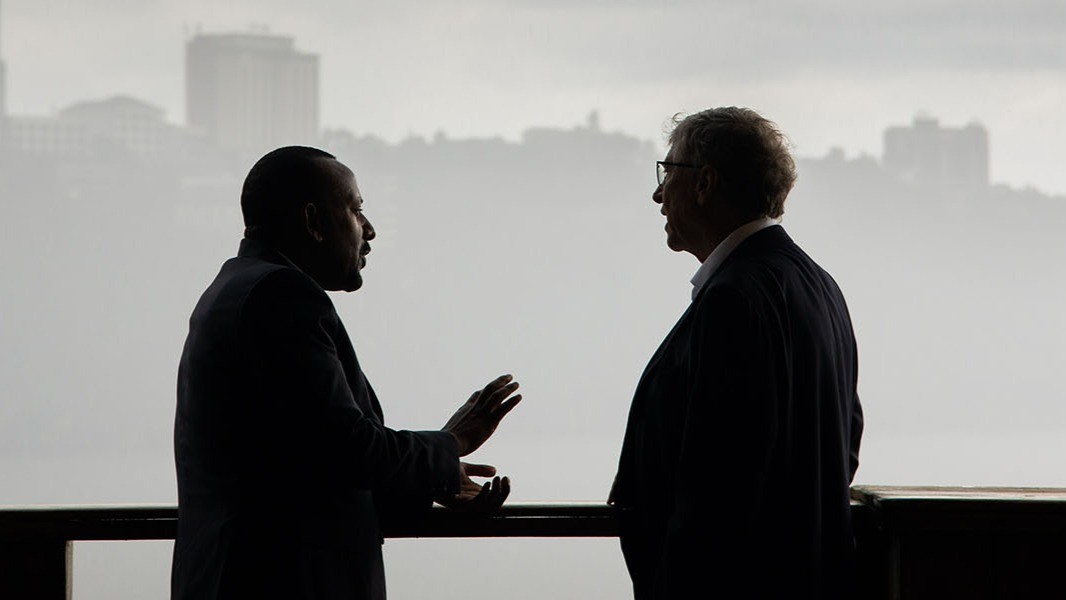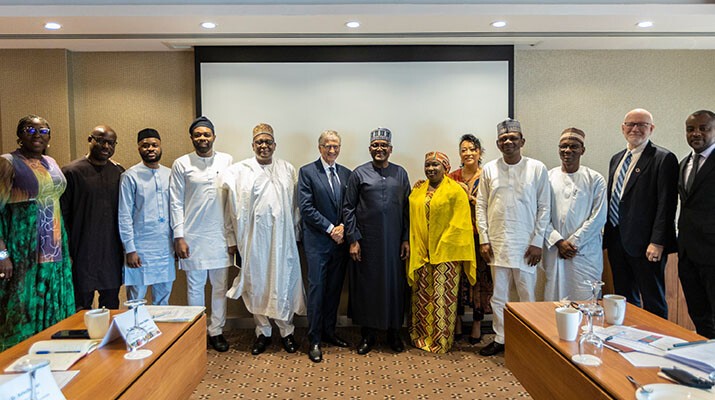Sharing things I'm learning through my foundation work and other interests. Hello 26 journées depuis
It was great to see digital health innovations like the Arogya Maitri Disaster Management Cube-BHISHM and discuss our shared commitment to leverage Indian research and technology to eliminate TB, sickle cell, and maternal anemia with
@mansukhmandviya
. Looking forward to continued partnership between
@BMGFIndia
and
@MoHFW_INDIA
.
It was great to see digital health innovations like the Arogya Maitri Disaster Management Cube-BHISHM and discuss our shared commitment to leverage Indian research and technology to eliminate TB, sickle cell, and maternal anemia with
@mansukhmandviya
. Looking forward to continued partnership between
@BMGFIndia
and
@MoHFW_INDIA
.
La batalla por la Inteligencia Artificial, editorial de El Periódico, 16.02.2025 https://elperiodico.com/es/opinion/editoriales/20250216/batalla-inteligencia-artificial-114342676 a través de
@elperiodico
Welcome to #BESummit24! The need to decarbonize our world has never been more pressing, but with extraordinary advancements in climate innovation, we are on the cusp of transformative change.
Tomorrow’s opening plenary promises to be an inspiring start.
Welcome to #BESummit24! The need to decarbonize our world has never been more pressing, but with extraordinary advancements in climate innovation, we are on the cusp of transformative change.
Tomorrow’s opening plenary promises to be an inspiring start.
WHOOP 🤝🏻 CR7 bands have dropped—are you team "home" or team "away"? Head to http://whoop.com/cr7 to get yours before they’re gone. #AD
I'm glad you could join us at the
@Breakthrough
Energy Summit! #BESummit24
Aidan’s work to end polio saved countless lives and touched even more. His optimism and commitment to helping others made him a leader in the field—and a great friend to everyone who knew him. I'm sending my deepest condolences to his family and loved ones during this difficult
Voir plus
Pleased to welcome
@BillGates
to #ethiopia once again. Always appreciate the great support of the Bill and Melinda Gates Foundation
@gatesfoundation
on our work on agriculture, health and financial inclusion. Our visit today to review wheat cluster productivity and poultry farming is a testament to deepening our partnership on Ethiopia’s determined path to food sovereignty.
Pleased to welcome
@BillGates
to #ethiopia once again. Always appreciate the great support of the Bill and Melinda Gates Foundation
@gatesfoundation
on our work on agriculture, health and financial inclusion. Our visit today to review wheat cluster productivity and poultry farming is a testament to deepening our partnership on Ethiopia’s determined path to food sovereignty.
Highlights of my trip to Nigeria and Ethiopia
Bill Gates
Bill Gates
Co-chair, Bill & Melinda Gates Foundation
6 septembre 2024
I’ve just wrapped up a busy five-day trip to Ethiopia and Nigeria. It’s the kind of trip that’s both tiring and energizing at the same time. Even though I stay in touch with a lot of partners in both countries—the Gates Foundation has been funding work in them for more than 15 years—there’s nothing quite like visiting to see the work in action.
Whenever I get home from a trip like this, friends are curious to hear how it went. Here’s what I’m telling them. From 2000 to 2019 or so, Ethiopia and Nigeria led the way on dramatic improvements in health and poverty that rippled across Sub-Saharan Africa. Since then, the pandemic, extreme weather, and political and economic instability have set both countries back, along with much of the rest of the continent. But as I saw on this trip, there’s great work going on in both places that makes me optimistic about their future, and Africa’s.
I want to share a few photos from the week. Thanks to everyone who shared their time and insights with me, including Prime Minister Ahmed of Ethiopia, Nigerian health minister Muhammad Ali Pate, and a special guest who came along for the trip: the amazing musician Jon Batiste. The foundation will be working with African partners even more in the future, and based on what I saw this week, my next visit will be just as inspiring.
I arrived in Addis Ababa on Sunday, and on Monday morning, I took a two-hour car ride with Prime Minister Ahmed to visit a cluster of wheat farms in Oromia region. On the way, we talked about a lot of different topics, including health care and the economy. But we probably spent the most time discussing the country’s amazing gains in agriculture, and the prime minister spoke with particular pride about one big accomplishment: Ethiopia no longer needs to import any wheat. It grows all its own.
The farm cluster we visited is a great example of how they’re doing it. Three years ago, the fields there weren’t farmed at all. Today, nearly 2,400 farmers there are working almost 100,000 acres of wheat, and they’re using innovative approaches to get the most out of the land. Among other things, they’ve adopted new varieties of wheat that resist disease and tolerate extreme weather. They’ve also created early warning systems that can detect and stop crop diseases before they spread too widely.
As a result of these reforms across the country, the average Ethiopian farmer now gets 70 percent more wheat per hectare than they did 15 years ago—a fantastic accomplishment that the foundation has been proud to support.
On the way back to Addis, we stopped at a poultry farm established by the Oromia government to help young people enter the poultry industry. They work there for two or three years, earn a salary and some start-up money, and then go off to start their own agriculture businesses. It was a noisy place—the farm has 20,000 chickens! But it was exciting to meet some aspiring farmers and businesspeople with big dreams.
After the poultry visit, I got to have lunch with the Prime Minister and three other government leaders: Dr. Mekdes Daba, the minister of health; Shimelis Abdisa, the President of Oromia region; and Dr. Mengistu Bekele, the head of the health bureau in Oromia. We discussed the major challenges of the past few years—including COVID and regional conflict—and how the government is using evidence-based strategies to overcome those challenges and make progress on polio, nutrition, immunization, and other issues.
From Ethiopia, I headed to Nigeria. In addition to having a great phone call with President Tinubu, I had a chance to meet in person with Nigeria's health minister, Muhammed Pate, and state leaders. We discussed the country's efforts to improve its primary healthcare systems—including the need for a realistic, well funded plan and the importance of using data to measure progress.
Healthcare was also a key focus of my remarks to the nation’s governors and cabinet ministers at the National Economic Council, where I emphasized the opportunity to improve efforts to stop vaccine-derived polio outbreaks in Nigeria.
Much of my time in Nigeria was focused on something that’s a priority for both the government and the Gates Foundation: malnutrition. About 40 percent of the people in Sub-Saharan Africa are undernourished, which translates into millions of kids who don’t get to fully develop physically or mentally. But there are a lot of innovations that can make a difference, and Nigeria is helping lead the way.
I joined an event called Nutrivision, which brought together 200 students working on some of those innovations. Ndidi Okonkwo Nwuneli, the Global CEO of The ONE Campaign, moderated a great Q&A—it’s always fun to hear what young people are thinking about and working on.
At Nutrivision, I had a blast meeting Tolani Tayo-Osikoya, better known as the Nigerian influencer and blogger Chef T. With more than 1 million followers, Chef T is spreading the word about good nutrition (along with great cooking tips). I admire the way she thinks about food security and the need to invest in innovative solutions so children across the country can have a healthy start in life.
Finally, I loved having Jon Batiste along for this trip. Jon is not only a brilliant musician, he’s also a great advocate for fighting hunger and malnutrition around the world and wanted to join so he could learn more about the work. Getting to know him made me even more enthusiastic about the foundation’s Goalkeepers meeting later this month, where Jon will be performing. See you in New York, Jon!
Highlights of my trip to Nigeria and Ethiopia
Bill Gates
Bill Gates
Co-chair, Bill & Melinda Gates Foundation
6 septembre 2024
I’ve just wrapped up a busy five-day trip to Ethiopia and Nigeria. It’s the kind of trip that’s both tiring and energizing at the same time. Even though I stay in touch with a lot of partners in both countries—the Gates Foundation has been funding work in them for more than 15 years—there’s nothing quite like visiting to see the work in action.
Whenever I get home from a trip like this, friends are curious to hear how it went. Here’s what I’m telling them. From 2000 to 2019 or so, Ethiopia and Nigeria led the way on dramatic improvements in health and poverty that rippled across Sub-Saharan Africa. Since then, the pandemic, extreme weather, and political and economic instability have set both countries back, along with much of the rest of the continent. But as I saw on this trip, there’s great work going on in both places that makes me optimistic about their future, and Africa’s.
I want to share a few photos from the week. Thanks to everyone who shared their time and insights with me, including Prime Minister Ahmed of Ethiopia, Nigerian health minister Muhammad Ali Pate, and a special guest who came along for the trip: the amazing musician Jon Batiste. The foundation will be working with African partners even more in the future, and based on what I saw this week, my next visit will be just as inspiring.
I arrived in Addis Ababa on Sunday, and on Monday morning, I took a two-hour car ride with Prime Minister Ahmed to visit a cluster of wheat farms in Oromia region. On the way, we talked about a lot of different topics, including health care and the economy. But we probably spent the most time discussing the country’s amazing gains in agriculture, and the prime minister spoke with particular pride about one big accomplishment: Ethiopia no longer needs to import any wheat. It grows all its own.
The farm cluster we visited is a great example of how they’re doing it. Three years ago, the fields there weren’t farmed at all. Today, nearly 2,400 farmers there are working almost 100,000 acres of wheat, and they’re using innovative approaches to get the most out of the land. Among other things, they’ve adopted new varieties of wheat that resist disease and tolerate extreme weather. They’ve also created early warning systems that can detect and stop crop diseases before they spread too widely.
As a result of these reforms across the country, the average Ethiopian farmer now gets 70 percent more wheat per hectare than they did 15 years ago—a fantastic accomplishment that the foundation has been proud to support.
On the way back to Addis, we stopped at a poultry farm established by the Oromia government to help young people enter the poultry industry. They work there for two or three years, earn a salary and some start-up money, and then go off to start their own agriculture businesses. It was a noisy place—the farm has 20,000 chickens! But it was exciting to meet some aspiring farmers and businesspeople with big dreams.
After the poultry visit, I got to have lunch with the Prime Minister and three other government leaders: Dr. Mekdes Daba, the minister of health; Shimelis Abdisa, the President of Oromia region; and Dr. Mengistu Bekele, the head of the health bureau in Oromia. We discussed the major challenges of the past few years—including COVID and regional conflict—and how the government is using evidence-based strategies to overcome those challenges and make progress on polio, nutrition, immunization, and other issues.
From Ethiopia, I headed to Nigeria. In addition to having a great phone call with President Tinubu, I had a chance to meet in person with Nigeria's health minister, Muhammed Pate, and state leaders. We discussed the country's efforts to improve its primary healthcare systems—including the need for a realistic, well funded plan and the importance of using data to measure progress.
Healthcare was also a key focus of my remarks to the nation’s governors and cabinet ministers at the National Economic Council, where I emphasized the opportunity to improve efforts to stop vaccine-derived polio outbreaks in Nigeria.
Much of my time in Nigeria was focused on something that’s a priority for both the government and the Gates Foundation: malnutrition. About 40 percent of the people in Sub-Saharan Africa are undernourished, which translates into millions of kids who don’t get to fully develop physically or mentally. But there are a lot of innovations that can make a difference, and Nigeria is helping lead the way.
I joined an event called Nutrivision, which brought together 200 students working on some of those innovations. Ndidi Okonkwo Nwuneli, the Global CEO of The ONE Campaign, moderated a great Q&A—it’s always fun to hear what young people are thinking about and working on.
At Nutrivision, I had a blast meeting Tolani Tayo-Osikoya, better known as the Nigerian influencer and blogger Chef T. With more than 1 million followers, Chef T is spreading the word about good nutrition (along with great cooking tips). I admire the way she thinks about food security and the need to invest in innovative solutions so children across the country can have a healthy start in life.
Finally, I loved having Jon Batiste along for this trip. Jon is not only a brilliant musician, he’s also a great advocate for fighting hunger and malnutrition around the world and wanted to join so he could learn more about the work. Getting to know him made me even more enthusiastic about the foundation’s Goalkeepers meeting later this month, where Jon will be performing. See you in New York, Jon!
Highlights of my trip to Nigeria and Ethiopia
Bill Gates
Bill Gates
Co-chair, Bill & Melinda Gates Foundation
6 septembre 2024
I’ve just wrapped up a busy five-day trip to Ethiopia and Nigeria. It’s the kind of trip that’s both tiring and energizing at the same time. Even though I stay in touch with a lot of partners in both countries—the Gates Foundation has been funding work in them for more than 15 years—there’s nothing quite like visiting to see the work in action.
Whenever I get home from a trip like this, friends are curious to hear how it went. Here’s what I’m telling them. From 2000 to 2019 or so, Ethiopia and Nigeria led the way on dramatic improvements in health and poverty that rippled across Sub-Saharan Africa. Since then, the pandemic, extreme weather, and political and economic instability have set both countries back, along with much of the rest of the continent. But as I saw on this trip, there’s great work going on in both places that makes me optimistic about their future, and Africa’s.
I want to share a few photos from the week. Thanks to everyone who shared their time and insights with me, including Prime Minister Ahmed of Ethiopia, Nigerian health minister Muhammad Ali Pate, and a special guest who came along for the trip: the amazing musician Jon Batiste. The foundation will be working with African partners even more in the future, and based on what I saw this week, my next visit will be just as inspiring.
I arrived in Addis Ababa on Sunday, and on Monday morning, I took a two-hour car ride with Prime Minister Ahmed to visit a cluster of wheat farms in Oromia region. On the way, we talked about a lot of different topics, including health care and the economy. But we probably spent the most time discussing the country’s amazing gains in agriculture, and the prime minister spoke with particular pride about one big accomplishment: Ethiopia no longer needs to import any wheat. It grows all its own.
The farm cluster we visited is a great example of how they’re doing it. Three years ago, the fields there weren’t farmed at all. Today, nearly 2,400 farmers there are working almost 100,000 acres of wheat, and they’re using innovative approaches to get the most out of the land. Among other things, they’ve adopted new varieties of wheat that resist disease and tolerate extreme weather. They’ve also created early warning systems that can detect and stop crop diseases before they spread too widely.
As a result of these reforms across the country, the average Ethiopian farmer now gets 70 percent more wheat per hectare than they did 15 years ago—a fantastic accomplishment that the foundation has been proud to support.
On the way back to Addis, we stopped at a poultry farm established by the Oromia government to help young people enter the poultry industry. They work there for two or three years, earn a salary and some start-up money, and then go off to start their own agriculture businesses. It was a noisy place—the farm has 20,000 chickens! But it was exciting to meet some aspiring farmers and businesspeople with big dreams.
After the poultry visit, I got to have lunch with the Prime Minister and three other government leaders: Dr. Mekdes Daba, the minister of health; Shimelis Abdisa, the President of Oromia region; and Dr. Mengistu Bekele, the head of the health bureau in Oromia. We discussed the major challenges of the past few years—including COVID and regional conflict—and how the government is using evidence-based strategies to overcome those challenges and make progress on polio, nutrition, immunization, and other issues.
From Ethiopia, I headed to Nigeria. In addition to having a great phone call with President Tinubu, I had a chance to meet in person with Nigeria's health minister, Muhammed Pate, and state leaders. We discussed the country's efforts to improve its primary healthcare systems—including the need for a realistic, well funded plan and the importance of using data to measure progress.
Healthcare was also a key focus of my remarks to the nation’s governors and cabinet ministers at the National Economic Council, where I emphasized the opportunity to improve efforts to stop vaccine-derived polio outbreaks in Nigeria.
Much of my time in Nigeria was focused on something that’s a priority for both the government and the Gates Foundation: malnutrition. About 40 percent of the people in Sub-Saharan Africa are undernourished, which translates into millions of kids who don’t get to fully develop physically or mentally. But there are a lot of innovations that can make a difference, and Nigeria is helping lead the way.
I joined an event called Nutrivision, which brought together 200 students working on some of those innovations. Ndidi Okonkwo Nwuneli, the Global CEO of The ONE Campaign, moderated a great Q&A—it’s always fun to hear what young people are thinking about and working on.
At Nutrivision, I had a blast meeting Tolani Tayo-Osikoya, better known as the Nigerian influencer and blogger Chef T. With more than 1 million followers, Chef T is spreading the word about good nutrition (along with great cooking tips). I admire the way she thinks about food security and the need to invest in innovative solutions so children across the country can have a healthy start in life.
Finally, I loved having Jon Batiste along for this trip. Jon is not only a brilliant musician, he’s also a great advocate for fighting hunger and malnutrition around the world and wanted to join so he could learn more about the work. Getting to know him made me even more enthusiastic about the foundation’s Goalkeepers meeting later this month, where Jon will be performing. See you in New York, Jon!
Highlights of my trip to Nigeria and Ethiopia
Bill Gates
Bill Gates
Co-chair, Bill & Melinda Gates Foundation
6 septembre 2024
I’ve just wrapped up a busy five-day trip to Ethiopia and Nigeria. It’s the kind of trip that’s both tiring and energizing at the same time. Even though I stay in touch with a lot of partners in both countries—the Gates Foundation has been funding work in them for more than 15 years—there’s nothing quite like visiting to see the work in action.
Whenever I get home from a trip like this, friends are curious to hear how it went. Here’s what I’m telling them. From 2000 to 2019 or so, Ethiopia and Nigeria led the way on dramatic improvements in health and poverty that rippled across Sub-Saharan Africa. Since then, the pandemic, extreme weather, and political and economic instability have set both countries back, along with much of the rest of the continent. But as I saw on this trip, there’s great work going on in both places that makes me optimistic about their future, and Africa’s.
I want to share a few photos from the week. Thanks to everyone who shared their time and insights with me, including Prime Minister Ahmed of Ethiopia, Nigerian health minister Muhammad Ali Pate, and a special guest who came along for the trip: the amazing musician Jon Batiste. The foundation will be working with African partners even more in the future, and based on what I saw this week, my next visit will be just as inspiring.
I arrived in Addis Ababa on Sunday, and on Monday morning, I took a two-hour car ride with Prime Minister Ahmed to visit a cluster of wheat farms in Oromia region. On the way, we talked about a lot of different topics, including health care and the economy. But we probably spent the most time discussing the country’s amazing gains in agriculture, and the prime minister spoke with particular pride about one big accomplishment: Ethiopia no longer needs to import any wheat. It grows all its own.
The farm cluster we visited is a great example of how they’re doing it. Three years ago, the fields there weren’t farmed at all. Today, nearly 2,400 farmers there are working almost 100,000 acres of wheat, and they’re using innovative approaches to get the most out of the land. Among other things, they’ve adopted new varieties of wheat that resist disease and tolerate extreme weather. They’ve also created early warning systems that can detect and stop crop diseases before they spread too widely.
As a result of these reforms across the country, the average Ethiopian farmer now gets 70 percent more wheat per hectare than they did 15 years ago—a fantastic accomplishment that the foundation has been proud to support.
On the way back to Addis, we stopped at a poultry farm established by the Oromia government to help young people enter the poultry industry. They work there for two or three years, earn a salary and some start-up money, and then go off to start their own agriculture businesses. It was a noisy place—the farm has 20,000 chickens! But it was exciting to meet some aspiring farmers and businesspeople with big dreams.
After the poultry visit, I got to have lunch with the Prime Minister and three other government leaders: Dr. Mekdes Daba, the minister of health; Shimelis Abdisa, the President of Oromia region; and Dr. Mengistu Bekele, the head of the health bureau in Oromia. We discussed the major challenges of the past few years—including COVID and regional conflict—and how the government is using evidence-based strategies to overcome those challenges and make progress on polio, nutrition, immunization, and other issues.
From Ethiopia, I headed to Nigeria. In addition to having a great phone call with President Tinubu, I had a chance to meet in person with Nigeria's health minister, Muhammed Pate, and state leaders. We discussed the country's efforts to improve its primary healthcare systems—including the need for a realistic, well funded plan and the importance of using data to measure progress.
Healthcare was also a key focus of my remarks to the nation’s governors and cabinet ministers at the National Economic Council, where I emphasized the opportunity to improve efforts to stop vaccine-derived polio outbreaks in Nigeria.
Much of my time in Nigeria was focused on something that’s a priority for both the government and the Gates Foundation: malnutrition. About 40 percent of the people in Sub-Saharan Africa are undernourished, which translates into millions of kids who don’t get to fully develop physically or mentally. But there are a lot of innovations that can make a difference, and Nigeria is helping lead the way.
I joined an event called Nutrivision, which brought together 200 students working on some of those innovations. Ndidi Okonkwo Nwuneli, the Global CEO of The ONE Campaign, moderated a great Q&A—it’s always fun to hear what young people are thinking about and working on.
At Nutrivision, I had a blast meeting Tolani Tayo-Osikoya, better known as the Nigerian influencer and blogger Chef T. With more than 1 million followers, Chef T is spreading the word about good nutrition (along with great cooking tips). I admire the way she thinks about food security and the need to invest in innovative solutions so children across the country can have a healthy start in life.
Finally, I loved having Jon Batiste along for this trip. Jon is not only a brilliant musician, he’s also a great advocate for fighting hunger and malnutrition around the world and wanted to join so he could learn more about the work. Getting to know him made me even more enthusiastic about the foundation’s Goalkeepers meeting later this month, where Jon will be performing. See you in New York, Jon!
Highlights of my trip to Nigeria and Ethiopia
Bill Gates
Bill Gates
Co-chair, Bill & Melinda Gates Foundation
6 septembre 2024
I’ve just wrapped up a busy five-day trip to Ethiopia and Nigeria. It’s the kind of trip that’s both tiring and energizing at the same time. Even though I stay in touch with a lot of partners in both countries—the Gates Foundation has been funding work in them for more than 15 years—there’s nothing quite like visiting to see the work in action.
Whenever I get home from a trip like this, friends are curious to hear how it went. Here’s what I’m telling them. From 2000 to 2019 or so, Ethiopia and Nigeria led the way on dramatic improvements in health and poverty that rippled across Sub-Saharan Africa. Since then, the pandemic, extreme weather, and political and economic instability have set both countries back, along with much of the rest of the continent. But as I saw on this trip, there’s great work going on in both places that makes me optimistic about their future, and Africa’s.
I want to share a few photos from the week. Thanks to everyone who shared their time and insights with me, including Prime Minister Ahmed of Ethiopia, Nigerian health minister Muhammad Ali Pate, and a special guest who came along for the trip: the amazing musician Jon Batiste. The foundation will be working with African partners even more in the future, and based on what I saw this week, my next visit will be just as inspiring.
I arrived in Addis Ababa on Sunday, and on Monday morning, I took a two-hour car ride with Prime Minister Ahmed to visit a cluster of wheat farms in Oromia region. On the way, we talked about a lot of different topics, including health care and the economy. But we probably spent the most time discussing the country’s amazing gains in agriculture, and the prime minister spoke with particular pride about one big accomplishment: Ethiopia no longer needs to import any wheat. It grows all its own.
The farm cluster we visited is a great example of how they’re doing it. Three years ago, the fields there weren’t farmed at all. Today, nearly 2,400 farmers there are working almost 100,000 acres of wheat, and they’re using innovative approaches to get the most out of the land. Among other things, they’ve adopted new varieties of wheat that resist disease and tolerate extreme weather. They’ve also created early warning systems that can detect and stop crop diseases before they spread too widely.
As a result of these reforms across the country, the average Ethiopian farmer now gets 70 percent more wheat per hectare than they did 15 years ago—a fantastic accomplishment that the foundation has been proud to support.
On the way back to Addis, we stopped at a poultry farm established by the Oromia government to help young people enter the poultry industry. They work there for two or three years, earn a salary and some start-up money, and then go off to start their own agriculture businesses. It was a noisy place—the farm has 20,000 chickens! But it was exciting to meet some aspiring farmers and businesspeople with big dreams.
After the poultry visit, I got to have lunch with the Prime Minister and three other government leaders: Dr. Mekdes Daba, the minister of health; Shimelis Abdisa, the President of Oromia region; and Dr. Mengistu Bekele, the head of the health bureau in Oromia. We discussed the major challenges of the past few years—including COVID and regional conflict—and how the government is using evidence-based strategies to overcome those challenges and make progress on polio, nutrition, immunization, and other issues.
From Ethiopia, I headed to Nigeria. In addition to having a great phone call with President Tinubu, I had a chance to meet in person with Nigeria's health minister, Muhammed Pate, and state leaders. We discussed the country's efforts to improve its primary healthcare systems—including the need for a realistic, well funded plan and the importance of using data to measure progress.
Healthcare was also a key focus of my remarks to the nation’s governors and cabinet ministers at the National Economic Council, where I emphasized the opportunity to improve efforts to stop vaccine-derived polio outbreaks in Nigeria.
Much of my time in Nigeria was focused on something that’s a priority for both the government and the Gates Foundation: malnutrition. About 40 percent of the people in Sub-Saharan Africa are undernourished, which translates into millions of kids who don’t get to fully develop physically or mentally. But there are a lot of innovations that can make a difference, and Nigeria is helping lead the way.
I joined an event called Nutrivision, which brought together 200 students working on some of those innovations. Ndidi Okonkwo Nwuneli, the Global CEO of The ONE Campaign, moderated a great Q&A—it’s always fun to hear what young people are thinking about and working on.
At Nutrivision, I had a blast meeting Tolani Tayo-Osikoya, better known as the Nigerian influencer and blogger Chef T. With more than 1 million followers, Chef T is spreading the word about good nutrition (along with great cooking tips). I admire the way she thinks about food security and the need to invest in innovative solutions so children across the country can have a healthy start in life.
Finally, I loved having Jon Batiste along for this trip. Jon is not only a brilliant musician, he’s also a great advocate for fighting hunger and malnutrition around the world and wanted to join so he could learn more about the work. Getting to know him made me even more enthusiastic about the foundation’s Goalkeepers meeting later this month, where Jon will be performing. See you in New York, Jon!
Highlights of my trip to Nigeria and Ethiopia
Bill Gates
Bill Gates
Co-chair, Bill & Melinda Gates Foundation
6 septembre 2024
I’ve just wrapped up a busy five-day trip to Ethiopia and Nigeria. It’s the kind of trip that’s both tiring and energizing at the same time. Even though I stay in touch with a lot of partners in both countries—the Gates Foundation has been funding work in them for more than 15 years—there’s nothing quite like visiting to see the work in action.
Whenever I get home from a trip like this, friends are curious to hear how it went. Here’s what I’m telling them. From 2000 to 2019 or so, Ethiopia and Nigeria led the way on dramatic improvements in health and poverty that rippled across Sub-Saharan Africa. Since then, the pandemic, extreme weather, and political and economic instability have set both countries back, along with much of the rest of the continent. But as I saw on this trip, there’s great work going on in both places that makes me optimistic about their future, and Africa’s.
I want to share a few photos from the week. Thanks to everyone who shared their time and insights with me, including Prime Minister Ahmed of Ethiopia, Nigerian health minister Muhammad Ali Pate, and a special guest who came along for the trip: the amazing musician Jon Batiste. The foundation will be working with African partners even more in the future, and based on what I saw this week, my next visit will be just as inspiring.
I arrived in Addis Ababa on Sunday, and on Monday morning, I took a two-hour car ride with Prime Minister Ahmed to visit a cluster of wheat farms in Oromia region. On the way, we talked about a lot of different topics, including health care and the economy. But we probably spent the most time discussing the country’s amazing gains in agriculture, and the prime minister spoke with particular pride about one big accomplishment: Ethiopia no longer needs to import any wheat. It grows all its own.
The farm cluster we visited is a great example of how they’re doing it. Three years ago, the fields there weren’t farmed at all. Today, nearly 2,400 farmers there are working almost 100,000 acres of wheat, and they’re using innovative approaches to get the most out of the land. Among other things, they’ve adopted new varieties of wheat that resist disease and tolerate extreme weather. They’ve also created early warning systems that can detect and stop crop diseases before they spread too widely.
As a result of these reforms across the country, the average Ethiopian farmer now gets 70 percent more wheat per hectare than they did 15 years ago—a fantastic accomplishment that the foundation has been proud to support.
On the way back to Addis, we stopped at a poultry farm established by the Oromia government to help young people enter the poultry industry. They work there for two or three years, earn a salary and some start-up money, and then go off to start their own agriculture businesses. It was a noisy place—the farm has 20,000 chickens! But it was exciting to meet some aspiring farmers and businesspeople with big dreams.
After the poultry visit, I got to have lunch with the Prime Minister and three other government leaders: Dr. Mekdes Daba, the minister of health; Shimelis Abdisa, the President of Oromia region; and Dr. Mengistu Bekele, the head of the health bureau in Oromia. We discussed the major challenges of the past few years—including COVID and regional conflict—and how the government is using evidence-based strategies to overcome those challenges and make progress on polio, nutrition, immunization, and other issues.
From Ethiopia, I headed to Nigeria. In addition to having a great phone call with President Tinubu, I had a chance to meet in person with Nigeria's health minister, Muhammed Pate, and state leaders. We discussed the country's efforts to improve its primary healthcare systems—including the need for a realistic, well funded plan and the importance of using data to measure progress.
Healthcare was also a key focus of my remarks to the nation’s governors and cabinet ministers at the National Economic Council, where I emphasized the opportunity to improve efforts to stop vaccine-derived polio outbreaks in Nigeria.
Much of my time in Nigeria was focused on something that’s a priority for both the government and the Gates Foundation: malnutrition. About 40 percent of the people in Sub-Saharan Africa are undernourished, which translates into millions of kids who don’t get to fully develop physically or mentally. But there are a lot of innovations that can make a difference, and Nigeria is helping lead the way.
I joined an event called Nutrivision, which brought together 200 students working on some of those innovations. Ndidi Okonkwo Nwuneli, the Global CEO of The ONE Campaign, moderated a great Q&A—it’s always fun to hear what young people are thinking about and working on.
At Nutrivision, I had a blast meeting Tolani Tayo-Osikoya, better known as the Nigerian influencer and blogger Chef T. With more than 1 million followers, Chef T is spreading the word about good nutrition (along with great cooking tips). I admire the way she thinks about food security and the need to invest in innovative solutions so children across the country can have a healthy start in life.
Finally, I loved having Jon Batiste along for this trip. Jon is not only a brilliant musician, he’s also a great advocate for fighting hunger and malnutrition around the world and wanted to join so he could learn more about the work. Getting to know him made me even more enthusiastic about the foundation’s Goalkeepers meeting later this month, where Jon will be performing. See you in New York, Jon!

